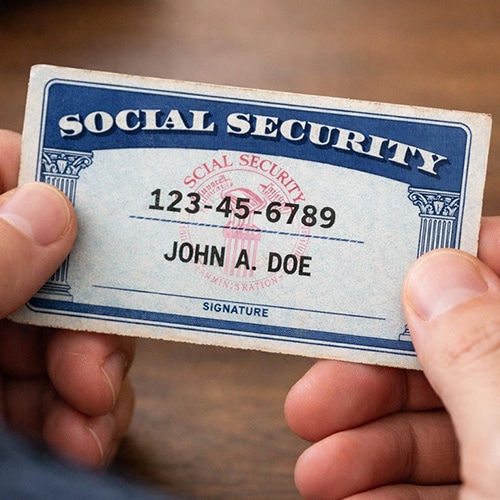Imagine working your entire career and one day you receive a notification that your Social Security benefits have been approved, but you never applied for them. Confused and alarmed, you dig deeper and realize someone has used your identity to receive government benefits. This terrifying situation, known as government benefits fraud, is an increasing threat.
Understanding government benefits fraud
Government benefits fraud occurs when someone illegally uses another person’s identity to claim benefits like Social Security, disability, or unemployment payments. Here’s how it usually unfolds:
- Data theft: Fraudsters obtain your personal information through data breaches, phishing, or the dark web.
- Application: Using your stolen identity, they apply for government benefits, often falsifying information to meet eligibility requirements.
- Collection: Once approved, they collect the benefits without you realizing it and potentially leave you in a difficult position to prove your innocence.
Real-world consequences
Here’s what you might face:
- Financial hardship: You could be denied the benefits you rightfully deserve because someone else has already claimed them.
- Legal troubles: Proving that you didn’t commit the fraud can be a long and arduous process and can require legal assistance.
- Emotional stress: The stress and anxiety of dealing with identity theft can be overwhelming, affecting your overall well-being.
How to protect yourself
Preventing government benefits fraud requires a mix of vigilance and proactive measures. Here’s a step-by-step guide to safeguard your identity:
1. Monitor your accounts
Regularly check your Social Security statements and other government benefit accounts. Look for any unfamiliar activity, such as benefits you didn’t apply for or changes in your personal information.
2. Secure your personal information
- Online Security: Use strong, unique passwords and a password manager for your accounts and enable two-factor authentication where possible.
- Physical Security: Shred sensitive documents before disposing of them and store important papers in a safe place.
3. Be wary of scams
- Phishing: Be cautious of emails or messages asking for personal information. Government agencies typically won’t ask for your personal details via email.
- Unsolicited calls: Verify the identity of anyone claiming to be from a government agency before providing information.
4. Use Identity Protection Services
Consider subscribing to identity theft protection services, which can monitor your personal information and alert you to suspicious activity.
Steps to take if you’re a victim
If you suspect you’re a victim of government benefits fraud, take immediate action:
- Report to authorities: Contact the agency providing the benefits (e.g., Social Security Administration) and report the fraud.
- File a police report: Having an official report can help in the investigation and any legal proceedings.
- Monitor your credit: Check your credit reports for any unusual activity and consider placing a fraud alert or freeze on your credit.
Government benefits fraud is a serious issue that can disrupt your life and financial stability. By understanding how it works and taking steps to protect yourself, you can reduce the risk of becoming a victim. It is important to secure your personal information and be proactive about monitoring your accounts. Remember, the best defense against identity theft is a strong offense.
Editor’s note: Our articles provide educational information. LifeLock offerings may not cover or protect against every type of crime, fraud, or threat we write about.
Start your protection,
enroll in minutes.
LifeLock is part of Gen – a global company with a family of trusted brands.
Copyright © 2026 Gen Digital Inc. All rights reserved. Gen trademarks or registered trademarks are property of Gen Digital Inc. or its affiliates. Firefox is a trademark of Mozilla Foundation. Android, Google Chrome, Google Play and the Google Play logo are trademarks of Google, LLC. Mac, iPhone, iPad, Apple and the Apple logo are trademarks of Apple Inc., registered in the U.S. and other countries. App Store is a service mark of Apple Inc. Alexa and all related logos are trademarks of Amazon.com, Inc. or its affiliates. Microsoft and the Window logo are trademarks of Microsoft Corporation in the U.S. and other countries. The Android robot is reproduced or modified from work created and shared by Google and used according to terms described in the Creative Commons 3.0 Attribution License. Other names may be trademarks of their respective owners.





